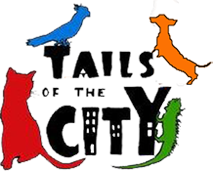?? Is your pet the cutest, scariest or silliest in his or her costume?…
Kindness Ranch
Kindness Ranch: American Sanctuary for Research Animals
Published April 26, 2013

Photo courtesy of Kindness Ranch
Rescued research dogs enjoy freedom after being saved by the Kindness Ranch.
Apes and bunnies are not the only animals used in research. A lot of pets and farm animals spend their time in disease research facilities and pet food companies across the country, most never even seeing daylight. Thankfully, a sanctuary started by Dr. David Groobman is changing the lives of some of these animals. Kindness Ranch, located on a 1,000 acre parcel in Hartville, Wyoming, is home to more than 60 rescued research dogs, cats, sheep, pigs, and horses. Kindness Ranch is the only sanctuary in the U.S. that takes in all kinds of retired research animals.
Laboratory animals have long held a special place in founder Dr. David Groobman’s heart. When he couldn’t find a sanctuary dedicated to their welfare (other than non-human primates), Dr. Groobman, a PhD in psychology, decided to start his own in 2007. With the help of other dedicated animal lovers, he built a dog yurt, a cat yurt, a manager’s yurt and four guest yurts in the beautiful rolling hill country of eastern Wyoming. Soon he started communicating with lab facilities in neighboring towns and bringing in animals that he could save.
Cats and dogs at the Kindness Ranch live together with their human caretakers in their spacious and eco-friendly yurts. They are well-cared for, rehabilitated and adopted to loving families. One of the adoptable dogs, Snip, was used in a Lyme disease study. The web site states, “Snip is ready for love! Even though he was debarked in the lab, he still makes sweet playful noises to get your attention. He has become a leader of our pups, earning him the status of Model Dog. Snip is ready for his forever home; will it be yours?” Another adoptable dog, Belle, likes to reach out and touch people with her left paw, possibly a habit from giving blood in the lab.
The horses come from food research facilities. Some of the rescued horses were destined for slaughter before being rescued by the Kindness Ranch. The pigs, prior to coming to the sanctuary, were used to teach students how to implant medical telemetry monitoring devices. The herd of sheep are babies of a sheep used from infectious sheep disease research. All of these animals are now healthy and free to roam the extensive pastures and hang out with volunteers, while they await their forever homes.

Photo courtesy of Kindness Ranch
Volunteer with rescued research cats enjoying sunshine and fresh air.
Animals that are too debilitated, old or ill to be placed remain on the ranch to live out their days in peace, surrounded by caretakers and volunteers who put the animals’ well-being first. With air and water so pure in the area, there’s plenty of room for the animals to run free or to be walked, to graze, to play, and to roll in the grass.
Maintaining relationships with research facilities is not an easy endeavor. Mike Stabler, Executive Director of Kindness Ranch, said, “I have learned how to establish trust by learning what their concerns might be and addressing them. I go to researcher conferences to present our program and establish connections.”
The Kindness Ranch recently rescued four beagles after a “fat dog” study. These dogs were fattened and then given a drug to measure weight-loss effectiveness. The Kindness Ranch staff decided to name one of the beagles Bones, stating, “We had so many suggestions for names for this boy. Because he’s such a DOG and because his bone marrow was taken for research, we decided to name him BONES!”
“I love watching research dogs touching grass for the first time!,” said Stabler. Kindness Ranch hopes to be able to rescue, rehabilitate and find loving homes for hundreds of retired research animals each year in the future.
“My long-term vision is to be able to accommodate at any one time more than 300 cats and dogs, as well as hundreds of small animals like rabbits and guinea pigs, and dozens of farm animals, including pigs, horses and sheep — all of them rescued from research facilities of one type or another,” stated Dr. Groobman on the web site.
The Kindness Ranch is always looking for volunteers, especially during winter months. Dedicated volunteers can stay at the Wyoming sanctuary for free as they care for the animals. The best time to visit is April through October. To visit or make a donation, visit: www.KindnessRanch.org

This Post Has 0 Comments